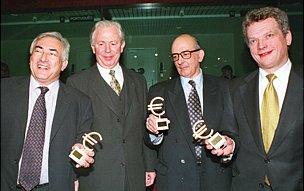Were the Eurosceptics right?
- Published
- comments

From the early days, Eurosceptics said the euro would lead to trouble
ATHENS As the architects of the single currency were drawing up their plans there were plenty of critics on the sidelines. They argued that you could not have a monetary union without fiscal union, without also co-ordinating tax and spending policies. They pointed out that a single interest rate would not work for such different economies.
"One size does not fit all," I remember them arguing. Others asked what would happen if a country got into difficulty when devaluation was impossible? All of these questions and more were asked at the time.
The drive behind the single currency was political. It was seen as a giant step on the road to a united Europe.
The large countries, particularly Germany, had reservations. The German people liked the stability of the Deutschemark. But there was another factor at play. Germany's history. After German reunification there was pressure on Chancellor Helmut Kohl to embed Germany more firmly in the European Union and to be part of a shared currency.
The Germans knew there were risks. That is why they pushed for a "no bail-out" clause. They feared they would end up shouldering the debts of others.
There was even intense argument over whether Greece should be included. But the designers of the euro feared that leaving out weaker economies could be divisive. What they did not want was a euro-zone made up of the richer, more stable economies. So the entry criteria was fudged and Greece eventually joined the single currency.
Rules flouted
The critics were dismissed as "naysayers", sceptics or the defenders of petty national interests. Initially, indeed, it looked as if they had been too pessimistic. With low interest rates, easy money, strong inward investment in the euro area, the good years followed. There was even debate in Britain about whether it would benefit from joining.
Sure there were hiccups. The Germans and the French broke the rules of the Growth and Stability Pact which demanded that deficits not exceed 3% of GDP. The big beasts of the eurozone flouted the rules and the other countries took notice.
But interest rates that might have suited Germany did not necessarily work for Spain and Ireland. Easy borrowing and strong capital inflows from Germany stoked up booms particularly in real estate. The euro, unintentionally, had set a trap for some of Europe's weaker economies.
They walked into it, ratcheted up debt and are are now saddled with years of austerity that are condemning a generation of young people to years of unemployment.
The debts truly came to light after the crash of 2008 when the financial system dried up.
In the good years what hadn't happened was that the economies of the euro-zone countries had grown more closely together. In places like Portugal productivity had not improved. Nor had the competitiveness gap narrowed. It was still very difficult to hire and fire workers in Spain and France.
All of this bubbled to the surface when the true extent of Europe's debt crisis was revealed. There were simply not the mechanism to deal with it and, for over a year, Europe's leaders have been involved in crisis management.
Vote for 'more Europe'?
When the eurozone crisis hit the sceptics believed time had proved them right. Interestingly, the integrationists did not entirely disagree. But the remedy they envisaged was entirely different. So alongside all the discussions about bail-outs the integrationists have seen opportunity for more Europe.
The Belgian Finance Minister, Didier Reynders, said the other day "the Greek crisis shows we need to reinforce Europe". Jean-Claude Juncker, from Luxembourg, while expressing enthusiasm for a European finance ministry said "what I like about it, is it calls for more Europe".
The director of European operations at the IMF, Antonio Borges, said: "We really believe that many of the current problems result from incomplete integration. In the process of developing monetary union like the United States, which is a fully integrated monetary union, you have obstacles that magnify the problem."
For many European leaders every question is examined through a prism of whether it leads to ever closer union. The sceptics may have been right in part - but the push is for more Europe not less.
The question is this - as it often is in the European Union - in pushing for closer integration will Europe's citizens get to vote or will it be done incrementally, by stealth?